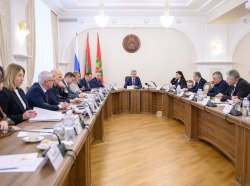Tiraspol, 8 January. /Novosti Pridnestrovya/. The principles of the Customs Code of the Eurasian Economic Union, which is to come into force this year, echo the challenges facing Pridnestrovie in the sphere of foreign economic activities and support for domestic business, reads the statement by the State Customs Committee (SCC) of the PMR.
The SCC leadership notes that the policy of harmonisation of Pridenstrovian and Russian legislation, as well as tasks set before the SCC by Vadim Krasnoselsky, suggests making fundamental changes in the customs legislation, including the Customs Code of the PMR, which was adopted back in 2000.
Meetings with Pridnestrovie's economic entities and businessmen were held in January-February by regional customs offices to elaborate, among other things, balanced approaches to the formation of the customs legislation. The SCC points out that the process of its update will be accompanied by interaction not only with economic agents but also with Supreme Council members, representatives of the Union of Industrialists, Agrarians and Entrepreneurs of Pridnestrovie and the Chamber of Commerce and Industry.
Following the visit of the head of the SCC, Vitaly Nyagu, to Russia's federal Customs Service, it was agreed to involve Russian customs specialists into a working group updating the Customs Code of the PMR.
«The main feature of the modern customs policy will be fundamentally different approaches to customs and business interaction, following which the interests of exporters and importers will be the priority and the customs' task will be to assist in their work, being, as they say, invisible," says the SCC leadership.
It is also noted that it will be also very helpful for the Pridnestrovian side to study the experience of their colleagues from Eurasian Economic Union countries in changing the algorithm of the interaction of business with state authorities, as well as approaches to IT-support for customs operations.








